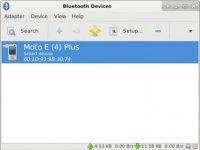Chuck(G)
25k Member
I picked up a few of the cheap USB Bluetooth dongles, but can't get them to work under either Ubutntu x64 nor Win7. They're registered by the driver software, but refuse to activate.
Here's the info for the dongle via lsusb:
And what hciconfig says:
I can't get the dongle to UP status, no matter what I try.
If I try "sudo hciconfig hci0 up" I get the following message:
Any ideas?
Oh yeah - lsb_release says:
TIA
Here's the info for the dongle via lsusb:
Code:
Bus 003 Device 002: ID 0a12:0001 Cambridge Silicon Radio, Ltd Bluetooth Dongle (HCI mode)And what hciconfig says:
Code:
hci0: Type: Primary Bus: USB
BD Address: 33:03:30:0A:C4:A3 ACL MTU: 360:4 SCO MTU: 0:0
DOWN
RX bytes:553 acl:0 sco:0 events:28 errors:0
TX bytes:368 acl:0 sco:0 commands:30 errors:0
Features: 0xff 0xff 0xcd 0xfa 0xdb 0xbf 0x7b 0x87
Packet type: DM1 DM3 DM5 DH1 DH3 DH5 HV1 HV2 HV3
Link policy: RSWITCH HOLD SNIFF PARK
Link mode: SLAVE ACCEPTI can't get the dongle to UP status, no matter what I try.
If I try "sudo hciconfig hci0 up" I get the following message:
Code:
Can't init device hci0: Operation not supported (95)Any ideas?
Oh yeah - lsb_release says:
Code:
Distributor ID: Ubuntu
Description: Ubuntu 18.04.2 LTS
Release: 18.04
Codename: bionicTIA
Last edited:


